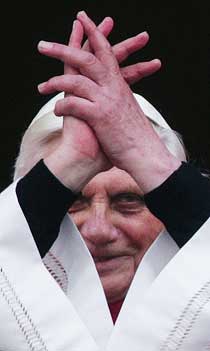Clever as always. If you want to read an excellent piece arguing that liberal/Democrat claims that Bush lied, misled, or misrepresented the truth,
read this.
If you would like an admittedly weak rebuttal, read on. I don't know as much about American involvement in Iraq as Hitchens, but I do know a snow job when I see one.
Hitch's column is approximately this: Democrat support for military action against Saddam has been inconsistent in the period 1998-2005. Dems supported a bill advising the removal of Saddam in 1998 but remained reticent about the use of military force. In 2002, they voted for the use of military force without specifying the removal of Saddam. To Hitchens, it is on this contradiction that "the remainder of the case depends."
I have no idea what this means.I assume Hitchens is trying to suggest that Democrats are and have been just plain confused about what the right and proper action with regards to Iraq is, and that this inconsistency undermines any attempt to take a strong position against the war now.
However, as Hitchens implicitly allows, this inconsistency is melted away if, as it is claimed, Bush & Co. duped Dems into supporting the war by feeding them faulty intelligence
or, alternatively, Chalabi and the Iraqi National Congress played all of us for fools, as others have claimed.
Hitchens brushes off the first option with the by now standard line "Congress saw the same intelligence sources before the war." He attacks the second option--that Chalabi pulled the wool over the entire Western intelligence community--by "proving" its improbability.
Hitchens attempts to split the options--that Bush lied/misled and that we were duped by Chalabi--with Occam's Razor, but the whole point is that these strands may be woven together. Hitchens approaches the liberal case as if it were an either/or when it is in fact a both/and. Bush or whoever directed intelligence to "find" certain evidence, and Chalabi and the INC assisted. Hitchens takes the benign motives of the intelligence community as fact, or attributes to them a success rate of finding out the "right" information that history simply does not support. For these reasons, his argument is brilliant, but totally incorrect.
Hitchens has one logical out, which he does not take--he could say that a combination of the two above options is even less probable than either one occurring individually, and since he has made the case against at least one of the options, it follows that the idea that Bush and Chalabi were in cahoots to hoodwink America is preposterous.
I would just like to point out a few other unlikely or really bizarre things:
a) Ahmed Chalabi has
more shit on him than a scarab beetle and yet he is welcomed to the US with open arms.
b) The claim that Congress saw
all the data available to the President. I seriously doubt
the President saw all the data available to the President, and I would assume the President typically has access to more intelligence than your average Congressman. Question is, what intelligence was not seen? And why?
c) Oil companies establish new world records for profits in a time of incredibly immense unrest in the Middle East. Not saying anything, just saying it
looks strange.
d) These
direct contradictions of fact don't matter.
e) Neither do
these.
f)
This.


